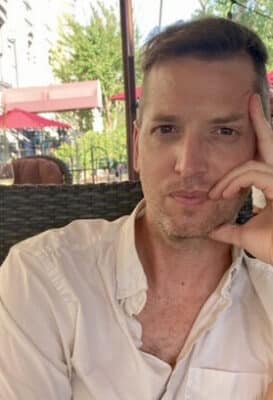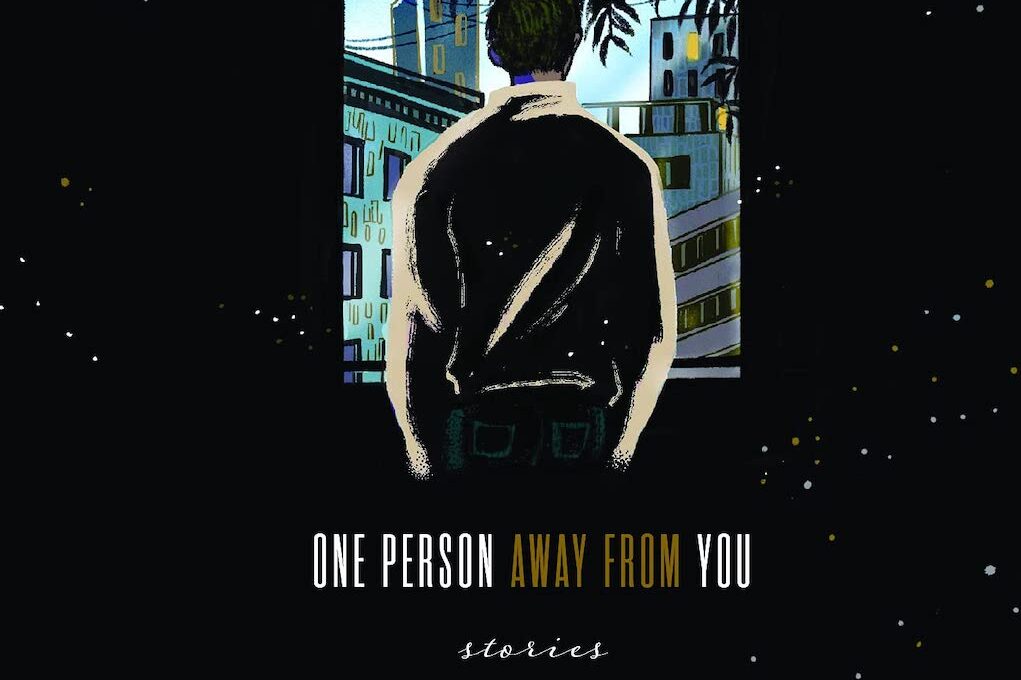Andrew Bertaina is no stranger to Cease, Cows. His story “In the Garden” was published in 2019, while “The Earth in its Flight” first appeared in 2016. Now Bertaina is out with a new collection, One Person Away from You. Bertaina’s fiction is original, heartfelt, and always entertaining. A typical Bertaina story straddles the line between the slightly surreal and the everyday, offering new insights into the way we live our lives.
Purchase your copy here.
Bertaina recently shared his thoughts with Cease, Cows.
Chuck Augello: How would you describe your work to someone who hasn’t read any of your stories yet?
Andrew Bertaina: I would say that my stories are investigations of time, memory, and loss. I also think the stories are varied because I wrote them over a long period of time in my life. But I do think the central concern with time, with loss, with the harsh reality of the lives we dream and the lives we are actually living run as a strong current through the collection.
I would also say I’m interested in making beautiful and emotionally impactful sentences. I think the collection reflects that attention to detail at a sentence level. From a pure storytelling perspective, I have an eye towards the slightly surreal. I’m interested in stories that are primarily set in a recognizable world, but include one small element of the fabulous or supernatural. The stories always come with that slight nostalgic bent though, the sense that something has been lost, like how you can’t remember all the details of a dream just after you awake.
CA: Several of your stories have a dream-like quality or specifically address a character’s dreams. What interests you about dreams?
AB: I think so much of our lives are comprised of hopes, desires, and regrets. Who sits on the porch and only talks about the day? We reflect back on our lives, our childhoods, the way a particular smell reminds us of a certain summer. Thus, I think my characters often spend time in that dream-like state, a waking dream of life. Of course, it’s also entirely possible to exist in a daze, sleepwalking through the routine and mundane aspects of life. Either way, I’d guess I’m not unique in having a fairly mundane day-to-day existence. Thus, our dreams and imagined lives take on an outsized existence that I’ve always been interested in.
Beyond that, the dream structure also allows me to play with the edges of reality in a way that I like. The dream space opens up a creative avenue that’s unavailable if I’m writing a strictly realist story. I also have some strictly realist stories in the collection, but I’m interested in the slightly surreal.
CA: “That Summer” is a wonderful story about young love and how people carry relationships with them long after things end. It features my favorite sentence in the book: “We were so passionate that we wanted to be on both sides, waving signs from across barriers at ourselves while chanting pithy slogans.” Such a wonderful image. What were you hoping to capture in that story?
AB: I wrote that story a number of years ago, and I think I was interested in the political fervor that was just beginning to sweep the country. We’re talking 2014 here, but you had this sense of a rising groundswell of momentum for our political lives to be more robust. We certainly ended up there. I could probably say a lot more about that, but I’d just point to a recent essay by Greg Jackson called, “Sources of Life” that captures a lot of where I’m at.
Anyhow, I think the story was trying to capture that feeling of wanting to do something but not quite having a handle on what exactly that protest or moment would look like. Obviously, the past few years have been clarifying in that regard, but this was a moment before some of the obvious discrepancies in our society had been fully enumerated.
Beyond that, the story is really about how our memories and hidden desire can suddenly rise unbidden into our conscious lives. Much has been said about Proust, about the deep attachment to smell, and the story is really about the way we may never forget a person we were in love with at nineteen, even decades later. And I don’t even mean because we see them on social media. I mean because some piece of our psyche will always have been formed by them, and the story is about the sudden release of this old lover into the narrator’s life.
CA: Two of the stories in the book were first published by Cease, Cows. “The Earth in Its Flight” is one of my favorites, with its depiction of people coming together to stabilize the Earth. How did you come to write that story?
AB: I’m so glad that two of my stories have found a home at Cease, Cows. “The Earth in Its Flight” was written from a playful space. As I am answering these questions, I’m noticing how much of my writing process is dictated by emotion. I wanted to write something playful, and I sort of followed the muse along the way, but I also conjured a narrator who was telling the story. I wanted a sort of gather around the fire feel to that story, and I wanted it to be happy or playful. So much of literary fiction is about sadness and loss, and it was really quite rewarding to write a story about love and coming together and working on a communal project.
CA: “It Sings” is another of my favorites. I enjoyed how the narrator and his wife make up details about how they met, with the narrator saying, “Life is about generating a proper narrative arc.” What was the initial spark for that story?
AB: Thank you for your kind words about the story. I’m glad you enjoyed it! That story really came from an emotional place as some of my stories do. I was trying to convey a feeling of loneliness in that story but also a desire for connection. A lot of the details for that story come from the honeymoon I took with my former wife. The story is about trying to reconnect and find that narrative arc that allows a couple to stay together for the long haul. I think the story was about inhabiting the space of loneliness with some hope for a reconnection.
CA: Which of the stories in One Person Away From You was the hardest to write? Do you have a favorite story in the book?
AB: I think I would probably equate hardest with the most time spent writing the story. I don’t think I have a strong sense of any emotional toll of writing the stories. Most of the stories require a bit of me emotionally and intellectually. The story, The Space Between Us, was probably the most difficult to write because it was long, and I had a fairly rough first draft. In general, I am able to get a workable first draft when I write a story, but I really messed that one up. Thus, I worked on the story on and off for around ten years before it got to a place that I felt good about. I just didn’t have a working sense of the story when it first came out.
In fact, it was the last story I submitted during my MFA, and I had just sort of run out of gas, so it was just something I had to do, and then I had to turn it from that into something worthwhile. As for a favorite story, it really depends on the mood I’m in. I like the first story, Everyone, because it came out in a single sitting. I think the story, The Arrival of the Sea, incorporates a lot of the elements that interest me now, but I’m going to say The Language of God because I think it explores a lot of my core themes, religion, relationships, family in a single story.
CA: Who are some of the authors whose work excites you?
AB: I wrote these stories over a number of years, so I feel I should cite my influences over time. I think George Saunders, Edward P Jones and Kelly Link were writers who excited me during graduate school. As time has gone by I’ve loved the work of Charles D’Ambrosio, Karl Ove Knausgaard, Teju Cole, Jorge Luis Borges Ross Gay, Deborah Eisenberg, Deborah Levy, Alice Munro, Rachel Cusk and Elena Ferrante. The list could go on and on.
However, I don’t always feel influenced by all of those writers. Sometimes a work of art captures me because it’s just so entertaining. Other times, I read the work and am immediately influenced and try to experiment or incorporate elements of the work into my own writing.
CA: Finally, there’s no shortage of ways to spend one’s time. Why do you choose to write fiction?
AB: That’s a really interesting question. I suppose my mother first introduced me to reading at a very young age, and it really stuck as a habit. When she read fantasy books to us it really transported me to another world, and I think humans are such creatures of stories and language. Of course, long-form television has largely superseded the novel as the primary form of storytelling, but it’s not how I grew up. The easy answer is that it’s a habit.
The longer answer is that fiction provides us interiority that we don’t get access to in our day-to-day life. At best, you have an amazing conversation with a friend that helps give you some access to their thinking. However, fiction allows you that inner access to other minds, and I almost always find that fascinating. I suppose that’s why I’m often drawn to personal essays these days or autofiction. I find something comforting about finding other lives that either mimic or seem to be in conversation with my own.
As for writing, it’s the only medium I’ve found where I can fully pour myself into the process. Whether it’s philosophy, geography, geology, or linguistics, you can use writing to explore the world and use all of your knowledge base. I don’t think of writing in a mystical sense, but it really is both terrifying, difficult, and rewarding. I can’t think of a more interesting way to spend my time!

–
Chuck Augello (Contributing Editor) lives in New Jersey with his wife, dog, two cats, and several cows that refuse to cease. His work has appeared in One Story, Juked, Hobart, SmokeLong Quarterly, and other fine places. He publishes The Daily Vonnegut and contributes interviews to The Review Review.

